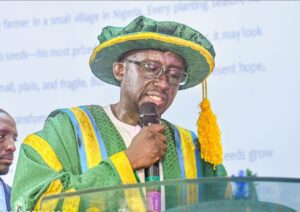The National Agricultural Development Fund (NADF) is spearheading agricultural transformation in Nigeria by implementing innovative strategies aimed at achieving growth, sustainability, and economic prosperity. This aligns with President Bola Tinubu’s Renewed Hope Agenda.
In a statement issued to newsmen in Kaduna on Sunday, the Executive Secretary of the fund, Muhammed Abu-Ibrahim, highlighted the agency’s transformative efforts. The statement was a fallout of the convocation lecture he presented on Saturday at the Federal University of Agriculture, Abeokuta, Ogun State.
Abu-Ibrahim emphasized the agency’s mission to harness the transformative power of agriculture, stating, “Our ultimate mission is to harness the transformative power of agriculture to further drive socio-economic development through inclusive financing and sustainable support.”
The fund focuses on four key areas: Inputs, implements, and mechanisation; infrastructure development, emergency response to agricultural disasters, and promotion of climate-smart agricultural practices.
Abu-Ibrahim underscored the importance of modern innovation in agriculture, remarking, “Agriculture today is a thriving playground of innovation, technology, and boundless opportunity.”
ALSO READ Muslim-Muslim presidency: Tinubu’s administration is inclusive – CAN
He revealed that NADF has achieved significant milestones, such as addressing the ginger blight epidemic in Kaduna State. This epidemic devastated 80 percent of Nigeria’s fastest-growing export commodity, impacting seven local governments, and over 10,000 hectares of farmland, and disrupting the entire ginger value chain.
On mechanisation, NADF is collaborating with John Deere and TATA Africa Services to deploy 10,000 tractors over five years, starting with 2,000 units this year. This initiative aims to boost crop yields, create jobs, and position Nigerian agriculture on the global stage.
Abu-Ibrahim highlighted partnerships with organisations such as GIZ for climate-smart agriculture, and NITDA for deploying advanced technologies like UAVs and blockchain in crop production.
Additionally, NADF conducted a comprehensive needs assessment of Agricultural Research Institutes (ARIs) and Federal Colleges of Agriculture (FCAs) to identify critical funding needs and explore viable projects for private sector investment.
Addressing graduating students, Abu-Ibrahim encouraged them to leverage technology and innovation to create opportunities in agriculture. “Agriculture thrives on partnerships. Work with other graduates, farmers, policymakers, and private sector stakeholders to build networks that foster mutual support,” he advised.
The NADF’s initiatives underscore its commitment to building a resilient agricultural sector capable of driving Nigeria’s economic growth and sustainability.


